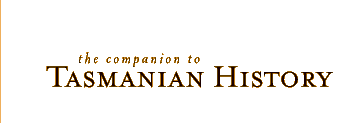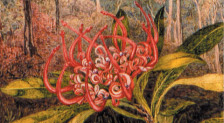 |
 |
|
Corruption
Corruption – adopting ethically dubious practices and breaching a position of trust, usually for money or personal advantage – has been a feature of Tasmanian life from the convict period through to the present. Police corruption appeared after Lt-Governor Arthur formed a police system in 1828. His largely convict police accepted bribes, arrested people who had done nothing wrong, prosecuted crimes where conviction gained them part of the fine, and planted incriminating evidence on innocent people. Police corruption has continued. Corruption in other parts of the public service began in the penal period. Under Lt-Governor Davey, bureaucrats in the Commissariat rorted the system by various frauds and embezzlement. Members of the Survey Department accepted 'presents' to increase the size of land grants. In 1832 Colonial Treasurer Jocelyn Thomas and Collector of Customs Rolla O'Ferrall were dismissed for embezzling public funds to the tune of at least £10,000. Tipping was essential if a settler wanted an assigned servant or land or if a convict wanted a ticket-of-leave. People in high office were accused of indulging in corruption. Arthur was often accused of using insider knowledge to profit from the purchase and sale of land and thus augment his personal fortune, but strong proof of wrongdoing was not forthcoming. After representative government was granted in 1855, securing votes by dispensing money, alcohol and food was a common practice until at least the 1880s. There were other examples of political corruption. In 1868 John Donnellan Balfe MHA agreed to edit the Mercury on the condition that he vote in the Assembly according to the opinions he expressed in his editorials and abstain from drinking. The agreement was discovered and hostile newspapers attacked Balfe for selling his vote. An Assembly Committee found that the agreement breached privilege by fettering Balfe's freedom to vote and act as he wished. Balfe, a self-styled constitutional expert who should have known better, and John Davies MHA, the owner of the Mercury, were censured by the Assembly. A case of conflict of interest occurred in 1899 when a select committee of the Assembly investigated allegations of dishonesty involving the Minister for Lands and Works, Edward Thomas Miles, the Strahan Marine Board of which Miles was Master Warden, and the proposed construction of the Macquarie Harbour breakwater. The committee found that Miles used his position as Master Warden 'for his own ends' and, 'improperly and secretly interested in two of the tenders for the West Breakwater', used 'unworthy means to secure the acceptance by the Board of the higher of these'. Miles resigned from the ministry, and the Assembly passed a no confidence motion against the Braddon Government, which resigned. From 1945 Tasmania experienced regular corruption scandals. That year sawmill proprietors, seeking preferential treatment, allegedly bribed Forestry Commission officers and the former Minister of Forests, Tom D'Alton. A 1946 royal commission found two of the four allegations to be true. In 1947, to gain protection from the threatened nationalisation of road transport services, private road transport operators claimed to have paid money to the Premier, Robert Cosgrove, for his personal use, unknown to the Labor Party. Though existence of this fund was admitted, Cosgrove was acquitted of criminal charges and won the ensuing election by a slim margin. In 1958 Dr RJD Turnbull was the subject of corruption allegations when lottery promoter George Fitzpatrick accused him of demanding £20,000 for a licence. A private police enquiry dismissed the allegation. In 1972 Kevin Lyons resigned from the Liberal–Centre Party government, in which he held the balance of power. This precipitated an election, which Labor won. In 1973 Labor members accused Lyons of accepting money from certain interested parties, including Federal Hotels and British Tobacco, to resign in order to bring his own government down, but the charges were not proven by a police enquiry. In 1973–74 rumours circulated that the Tasmanian Bookmakers' Association had clandestinely paid money to Mervyn Everett while he was Deputy Leader of the Opposition to stop the introduction of totalisator betting facilities in Tasmania. Despite evidence that money had changed hands, no charges were laid. The totalisator legislation provided many concessions to bookmakers. More recently, in 1989 Tasmanian media grandee Edmund Rouse, worried by the growing popularity of the Greens, clumsily attempted to bribe Jim Cox, a newly elected Labor member, with $110,000 over five years to support the minority Gray Liberal Government. Rouse was gaoled for three years, fined $4,000 and barred from holding a company position for five years after his release, but no charges were proven against Gray. Close relations between government and big business or other sectional interests will always provide opportunities for corruption in the insular world of Tasmanian politics and, incompetence apart, will always be hard to prove. Further reading: S Bennett, 'Electoral corruption in the Huon', THRAPP 32/1, 1985; and 'Political corruption', THRAPP 39/4, 1992; P Hay, 'Factors conducive to political corruption', Political Science 29, 1977. Stefan Petrow |
Copyright 2006, Centre for Tasmanian Historical Studies |
